
The SEO world was abuzz late last week with speculation that Google is on the path to encrypting all search activity (except for ad clicks). This would mean marketers and site owners would see a lot more traffic coming from the dastardly “(not provided)” source in their analytics and a lot less helpful information about what search terms are driving traffic to their website.
Behind all of the confusion and speculation around this significant change, there are some basic things every search marketer should know to ensure he or she is prepared for the inevitable day with search activity on Google is entirely encrypted.
Some Historical Background
As most digital marketers have seen, the amount of organic search traffic data missing search queries (keywords) in their Web analytics has been steadily increasing each month since Google’s initial encryption of searches back in October 2011. At that time, Google prevented the search terms, of anyone logged into a Google account while searching, from passing through to a website’s analytics. The result was (not provided) being displayed in the place of actual keywords in organic search traffic reports. This meant that keyword level performance analyses could no longer include all data, but rather a sample set of those organic visits that did pass through keyword-level data.
Today, the picture is even less encouraging. Not Provided Count, which tracks 60 sites to chart the rise of the keyword “(not provided),” has been reporting on the effects of encrypted keywords over time. In the chart below, you’ll notice a spike starting around the week of Sept. 4, 2013. Today, the chart indicates that nearly 74% of search terms are being encrypted.
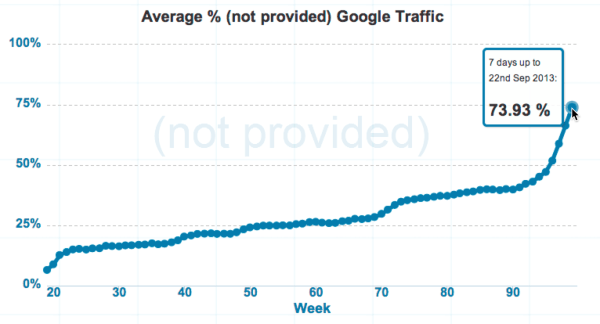
As more and more consumers adopted Google products, such as Gmail, Google + and Chrome, the percentage of encrypted search data has steadily risen because a higher percentage of those searching are logged into a Google account. This made the sample size of organic data even smaller, thus making it even more difficult to report on and analyze organic search activity. There was still the ability, however, to make informed assumptions based on the sample data that was not encrypted.
There has been a dramatic increase of encrypted search data in recent weeks that was found as a result of Google’s quiet decision to begin encrypting data for all users, not just those who are signed in. As this implementation progresses it’s expected that in Q4 of this year, there will be no keyword data reported from Google organic search traffic.
As the below keyword data report shows marketers are increasingly being shown “(not provided)” or “Unknown keywords (SSL))” when analyzing keyword data.
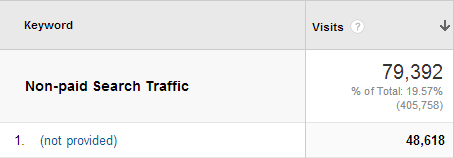
This will, of course, have a tremendous impact on the entire search marketing industry, not only as far as how success is measured, but also how strategy is derived and opportunities are identified. A sample set of keyword data will no longer be available, so marketers must leverage alternate means of analyzing performance of the organic search channel and building their strategies to continuously improve that performance.
Below is an analysis of the implications and challenges posed by this new paradigm of how organic search data is reported, as well as what steps should be taken to continue search marketing efforts using data.
Key Takeaways
- Keyword-level organic search analytical data will no longer be available for Google searches.
- Page-level performance analysis will help replace keyword-level analyses.
- Third-party tools can help fill in the gaps left by Google’s keyword encryption.
Two-Year Timeline to Securing All Searches
From the time Google began encrypting searches in late-2011, there has been a steady but aggressive increase in the percentage of search keywords reported as (not provided), with several highlights. It is expected that no all-organic-search keywords in Google will be (not provided) by Q4 2013.
Here is a detailed breakdown of the progress Google has made in encrypting users’ searches:
October 2011
- Beginning of encrypted search
- Only affected searches are those from users logged into Google
- Google cited privacy as reason
- Less than 1% of searches not provided
March 2012
- Sharp increase in encryption; more than 13% of searches not provided
April 2012 – August 2013
- Steady increase from 14% to 48% of searches not provided
September 2013
- Encrypted search first implemented for non-signed in users
- 77% of searches not provided
Q4 2013 (Anticipated)
- Full-scale encrypted search
- 100% of searches not provided
The Impact of Encrypted Searches on Online Marketing
With Google encrypting 100% of searches there are some challenges that search marketers will need to overcome.
First, the manner in which we collect, analyze and report on search data to make business decisions must evolve.
Because we will no longer receive data telling us which keywords are driving traffic, we need to identify new ways to answer these very important questions, including:
- How will we find opportunities to improve a page’s organic search performance?
- Is there a way of connecting ranking improvements to traffic growth?
- Can we still understand how searchers perceive your brand and content?
- Are there alternate ways of uncovering new keyword opportunities to go after?
Without identifying ways to answers these questions, it will be very difficult to quantify the efforts of organic search campaigns. Thankfully, there are some great alternatives to collecting this data that can be leveraged to continue to make strategic decisions.
Seven Strategies for Overcoming Encrypted Searches
With the lack of keyword-level data, marketers will need to find different ways to understand the performance of search campaigns and leverage reliable data that is still available to make actionable decisions.
Here are seven actionable methods of making those decisions:
Strategy #1: Integrate Google Webmaster Tools with Google Analytics
Connecting a Google Webmaster Tools account to a Google Analytics account allows you to see the following keyword level data:
- Impressions
- Clicks
- Average position in Google
- Click-through rate
Here are instructions to connect the accounts: http://googlewebmastercentral.blogspot.com/2011/02/linking-google-analytics-towebmaster.html
Strategy #2: Leverage Paid Search Data
Google’s encryption is specific to organic search data. Activity on paid search ads will still pass keyword-level data. If any non-branded paid search campaigns are running or have been run, such as with Google AdWords, taking a look into what keywords are driving traffic and conversions will give you some insight into terms that you may want to focus on from an organic search perspective.
Strategy #3: Analyze Page-Level Data as an Alternative to Keyword-Level Data
Analyzing data from a page level perspective tied in with keyword ranking data can help us understand how well a set of keywords being targeted are performing. As a result you may be able to make further improvements to the page. Some data points that you will want to analyze include:
- Traffic to the page
- Bounce Rate
- Time on Page
- Conversion path initiated from the page
- Keywords the page ranks for and the position(s)
By identifying which pages are performing well from a traffic and engagement basis (bounce rate, time on page, conversion) and the keywords the page ranks for, you will have an idea of how well those keywords perform.
Strategy #4: Leverage Google Trends and AdWords for Insights
Even though we will not know which keyword our search traffic is coming from (or whether its branded or non-branded) we can leverage things such as Google Trends to help us identify upticks in branded search volume and as a result non-branded lifts.
The below screenshot shows historical search interest in Nike. You can see the uptick in demand as times goes on and we can then correlate this to search traffic. This relationship between the two variables will allow us to tell if traffic is up or down and helps us make educated assessments.
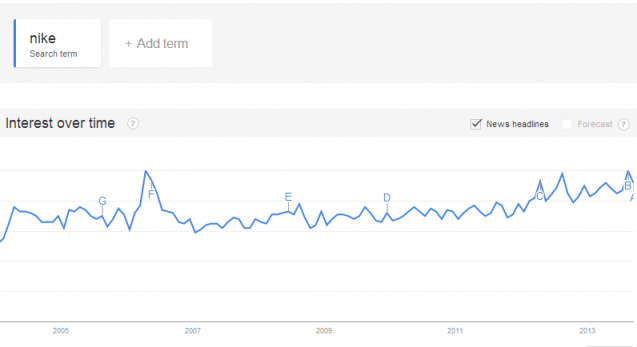
Strategy #5: Leverage Branded Pay-Per-Click Campaigns
You can leverage your branded pay-per-click campaigns in the same manner as leveraging Google Trends and Adwords for insights. If your branded campaigns experience the same traffic volume but overall search traffic is increasing you can make assumptions that your non-branded search traffic is on the rise.
Strategy #6: Track and Compare Buckets of Keyword Rankings to Page Visits
Create buckets of keyword rankings such as branded, non-branded, short-tail, long-tail and groupings of topical keywords. Map these keywords to the pages which are ranking for these keyword buckets and analyze the performance of those pages. This will help give an indication of how well the keyword groups are performing.
Taking it a step further and then understanding the conversion funnel from these landing pages will help to provide an understanding of how valuable various types of keywords are to your business.
Strategy #7: Use Keyword Suggestion Sources to Understand How Searchers are Looking for Your Content
There are plenty of keyword suggestions sources such as Google Suggest, the aforementioned AdWords, SEMRush and Ubersuggest to see the popularity of keywords related to your brand. These tools will help you identify some keyword opportunities that you may want to focus some of your efforts on.
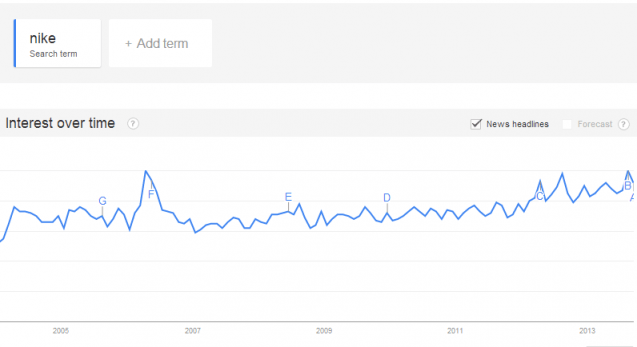
There are plenty of keyword suggestions sources such as Google Suggest, the aforementioned AdWords, SEMRush and Ubersuggest to see the popularity of keywords related to your brand. These tools will help you identify some keyword opportunities that you may want to focus some of your efforts on.

You can also leverage internal search data (if available) to gain an understanding for how visitors are searching for related content once they are on your property.
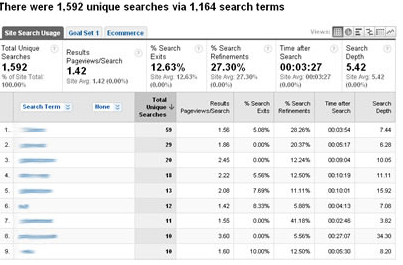
Conclusion
Google’s changes will greatly affect how search marketing campaigns are built, executed, and optimized. Taking the primary focus off the keyword level data and placing more effort around page level data is going to be the key to success. Taking a more holistic approach to website performance as opposed to dwelling on specific keywords will be the future of SEO.



